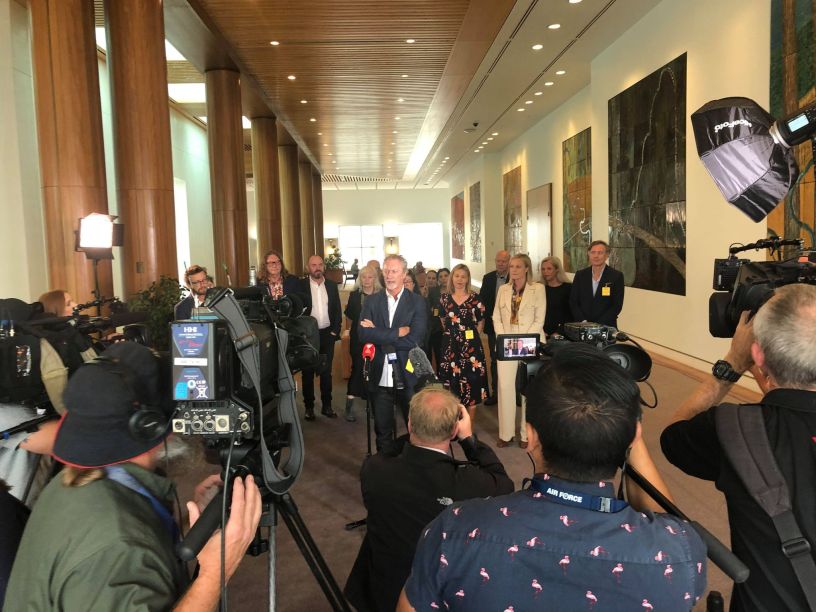A delegation of actors, crew, writers, and producers have converged on Canberra to push for local content requirements for SVOD and AVOD platforms, as well as other reforms relating to the screen sector.
Actors Simon Baker, Bryan Brown, Marta Dusseldorp, and Justine Clarke jointed Flying Bark Productions CEO Barbara Stephen, and Blue Rocket Productions co-founder David Gurney at Parliament House today as part of the Make it Australian campaign.
Spearheaded by the Australian Directors’ Guild (ADG), Australian Writers’ Guild (AWG), Media, Entertainment & Arts Alliance (MEAA), and Screen Producers Australia (SPA), the campaign previously took to the capital in 2019 to lobby on similar issues.
Since then, the government has proposed in a green paper that streaming services be required to invest a percentage of their revenue on Australian content in the form of commissions, co-productions, and acquisitions. It is consulting on the paper until late May.
The Make It Australian campaign is lobbying for streaming platforms to spend 20 per cent of their local revenue on new Australian drama, documentary, and children’s content.
“Governments over many decades have recognised our need to experience our own stories told in our own voices, whether it’s on TV or at the movies,” said ADG executive director Alaric McAusland.
“With streaming platforms such as Netflix, Stan and Disney+ notching up 16 million Australian subscriptions, the time is right to ensure Australians can see their stories on those platforms too.”
SPA CEO Matthew Deaner, who fronted the House Standing Committee on Communications and the Arts last month, said the campaign’s proposal was aligned with reforms seen in other territories.
“A requirement of 20 per cent follows similar precedents set in France and Canada for streaming platforms,” he said.
“It would create up to 10,000 sustainable local jobs and would unleash the potential of the local industry, which would, over time, double in size.”
The campaign also calling for the government’s proposed changes to the offsets, as announced last September, to be reconsidered. This includes the harmonisation of the film and TV Producer Offsets at 30 per cent, and the increase of the QAPE threshold from $500,000 to $1 million for features.
It is also opposed to the minimum expenditure threshold of Post, Digital and Visual Effects (PDV) Offset increasing $500,000 to $1 million.
MEAA CEO Paul Murphy said the government should act “with urgency” in the wake of the Media Reform Green Paper.
“The government’s staged process of media reform is incomplete,” he said.
“Having made drastic cuts to Australian drama, kids, and documentary content on commercial free-to-air and subscription television, there is an urgent need to ensure that streaming platforms are making up those losses to avoid a damaging contraction in the local screen sector.
“We need the government to ensure that our stories are thriving and connecting Australians as our industry recovers from COVID and get ready to take on the world.”
AWG president Shane Brennan said the government’s two years of additional funding for Screen Australia, announced as part of last year’s federal budget, was “little more than a stopgap” in relation to the permanent loss of funding.
“In particular, the reduction of the rate of offset from 40 per cent to 30 per cent could prevent films like The Dry, Penguin Bloom, and High Ground – the summer’s box office success stories – from being financed in the future,” he said.


